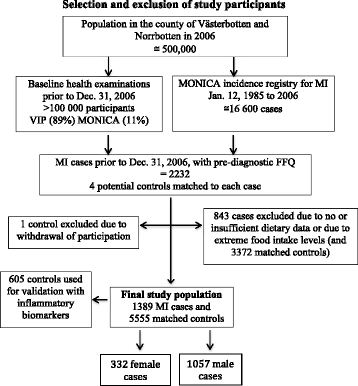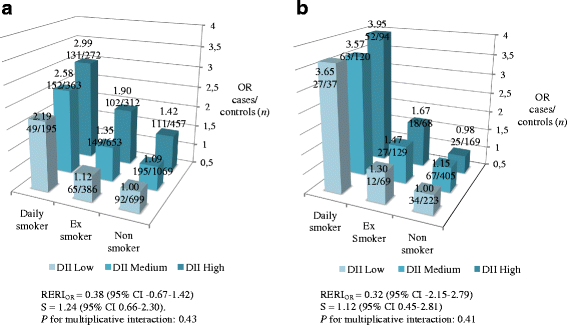Dietary inflammatory index and risk of first myocardial infarction; a prospective population-based study
- PMID: 28376792
- PMCID: PMC5379659
- DOI: 10.1186/s12937-017-0243-8
Dietary inflammatory index and risk of first myocardial infarction; a prospective population-based study
Abstract
Background: Chronic, low-grade inflammation is an established risk factor for cardiovascular disease. The inflammatory impact of diet can be reflected by concentrations of inflammatory markers in the bloodstream and the inflammatory potential of diet can be estimated by the dietary inflammatory index (DIITM), which has been associated with cardiovascular disease risk in some previous studies. We aimed to examine the association between the DII and the risk of first myocardial infarction (MI) in a population-based study with long follow-up.
Method: We conducted a prospective case-control study of 1389 verified cases of first MI and 5555 matched controls nested within the population-based cohorts of the Northern Sweden Health and Disease Study (NSHDS), of which the largest is the ongoing Västerbotten Intervention Programme (VIP) with nearly 100 000 participants during the study period. Median follow-up from recruitment to MI diagnosis was 6.4 years (6.2 for men and 7.2 for women). DII scores were derived from a validated food frequency questionnaire (FFQ) administered in 1986-2006. Multivariable conditional logistic regression models were used to estimate odds ratios (OR) and 95% confidence intervals (CI), using quartile 1 (most anti-inflammatory diet) as the reference category. For validation, general linear models were used to estimate the association between the DII scores and two inflammatory markers, high-sensitivity C-reactive protein (hsCRP) and interleukin 6 (IL-6) in a subset (n = 605) of the study population.
Results: Male participants with the most pro-inflammatory DII scores had an increased risk of MI [ORQ4vsQ1 = 1.57 (95% CI 1.21-2.02) P trend = 0.02], which was essentially unchanged after adjustment for potential confounders, including cardiovascular risk factors [ORQ4vsQ1 = 1.50 (95% CI 1.14-1.99), P trend = 0.10]. No association was found between DII and MI in women. An increase of one DII score unit was associated with 9% higher hsCRP (95% CI 0.03-0.14) and 6% higher IL-6 (95% CI 0.02-0.11) in 605 controls with biomarker data available.
Conclusion: A pro-inflammatory diet was associated with an elevated risk of first myocardial infarction in men; whereas for women the relationship was null. Consideration of the inflammatory impact of diet could improve prevention of cardiovascular disease.
Keywords: CVD cardiovascular disease; DII Dietary inflammatory index; IL-6 interleukin 6; MI Myocardial infarction; MONICA Monitoring of trends and determinants in cardiovascular disease; NSHDS Northern Sweden health and disease study; VIP Västerbotten intervention programme; hsCRP high-sensitivity C-reactive protein.
Figures


Similar articles
-
Dietary inflammatory index, cardiometabolic conditions and depression in the Seguimiento Universidad de Navarra cohort study.Br J Nutr. 2015 Nov 14;114(9):1471-9. doi: 10.1017/S0007114515003074. Epub 2015 Sep 7. Br J Nutr. 2015. PMID: 26344165
-
Dietary inflammatory index and inflammatory biomarkers in adolescents from LabMed physical activity study.Eur J Clin Nutr. 2018 May;72(5):710-719. doi: 10.1038/s41430-017-0013-x. Epub 2017 Dec 26. Eur J Clin Nutr. 2018. PMID: 29277838
-
Validating the dietary inflammatory index using inflammatory biomarkers in a Japanese population: A cross-sectional study of the JPHC-FFQ validation study.Nutrition. 2020 Jan;69:110569. doi: 10.1016/j.nut.2019.110569. Epub 2019 Aug 17. Nutrition. 2020. PMID: 31574409
-
Association between dietary inflammatory index and inflammatory markers in the HELENA study.Mol Nutr Food Res. 2017 Jun;61(6):10.1002/mnfr.201600707. doi: 10.1002/mnfr.201600707. Epub 2017 Feb 22. Mol Nutr Food Res. 2017. PMID: 27981781 Free PMC article. Review.
-
Dietary Inflammatory Index and Cardiovascular Risk and Mortality-A Meta-Analysis.Nutrients. 2018 Feb 12;10(2):200. doi: 10.3390/nu10020200. Nutrients. 2018. PMID: 29439509 Free PMC article. Review.
Cited by
-
Dietary inflammatory index in relation to severe coronary artery disease in Iranian adults.Front Nutr. 2023 Sep 29;10:1226380. doi: 10.3389/fnut.2023.1226380. eCollection 2023. Front Nutr. 2023. PMID: 37841398 Free PMC article.
-
Assessment of Dietary Patterns Represents a Potential, Yet Variable, Measure of Inflammatory Status: A Review and Update.Dis Markers. 2019 Jan 20;2019:3102870. doi: 10.1155/2019/3102870. eCollection 2019. Dis Markers. 2019. PMID: 30805036 Free PMC article. Review.
-
Association between Dietary Inflammatory Index and Risk of Cardiovascular Diseases Among Firefighters.Int J Prev Med. 2020 Sep 3;11:133. doi: 10.4103/ijpvm.IJPVM_256_19. eCollection 2020. Int J Prev Med. 2020. PMID: 33088461 Free PMC article.
-
Relationship between the 10-Year Risk for Atherosclerotic Cardiovascular Disease and the Dietary Inflammatory Index among Korean Adults Based on the Seventh Korea National Health and Nutrition Examination Survey (KNHANES).Biomed Res Int. 2020 May 26;2020:8196798. doi: 10.1155/2020/8196798. eCollection 2020. Biomed Res Int. 2020. PMID: 32596379 Free PMC article.
-
Association between waist triglyceride index, body mass index, dietary inflammatory index, and triglyceride- glucose index with chronic kidney disease: the 1999-2018 cohort study from NHANES.Front Endocrinol (Lausanne). 2024 Aug 5;15:1390725. doi: 10.3389/fendo.2024.1390725. eCollection 2024. Front Endocrinol (Lausanne). 2024. PMID: 39161393 Free PMC article.
References
-
- Nettleton JA, Steffen LM, Mayer-Davis EJ, Jenny NS, Jiang R, Herrington DM, et al. Dietary patterns are associated with biochemical markers of inflammation and endothelial activation in the Multi-Ethnic Study of Atherosclerosis (MESA). Am J Clin Nutr. 2006;83(6):1369–79. https://www.ncbi.nlm.nih.gov/pubmed/16762949. PMCID:PMC2933059. - PMC - PubMed
Publication types
MeSH terms
Substances
Grants and funding
LinkOut - more resources
Full Text Sources
Other Literature Sources
Medical
Research Materials

